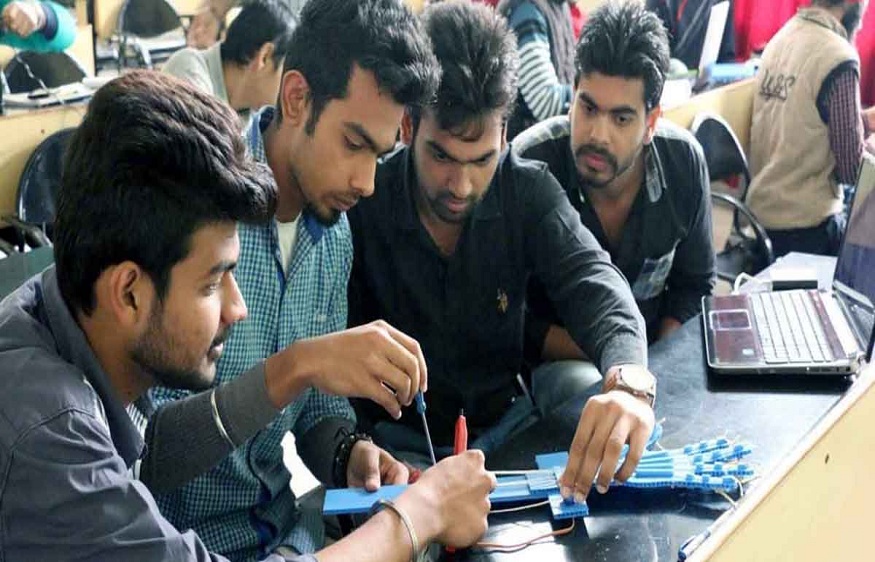With a growing focus on innovation and technology, Indian engineers are playing a crucial role in shaping the country’s future and driving progress on a global scale. Government initiatives, such as the “Make in India” campaign and investment in R&D, are also expected to drive the growth of the engineering sector further and create new opportunities for engineers in India.
Also, we know that software outsourcing is a significant source of revenue for India, and Indian companies are actively seeking software-related work from onshore & offshore clients, leading to a substantial requirement for a growing talent pool to meet their demands. Furthermore, with technological advancements, India is also becoming involved in cutting-edge fields such as semiconductors, robotics, and artificial intelligence, offering numerous research opportunities and attracting investment from multinationals in search of talented engineers.
India is home to public sector organisations like SAIL, NTPC, GAIL, ONGC, and PSUs, as well as private companies like Larsen and Toubro, Reliance, Tata, and Essar, providing ample job opportunities for engineers.
All these opportunities show how prolific the market will be for future B.Tech graduates. So, if you are planning to pursue a B.Tech course, you may start preparing.
[Also Read: Top new technology trends]
Best Engineering Fields for the Future in India
The engineering field has many exciting and rapidly growing areas that are expected to significantly impact the future. Some of the best engineering fields for the future in India are:
- Artificial Intelligence and Machine Learning – These fields involve using algorithms and models to create systems that can learn and make decisions. They have applications in various industries, and significant growth is expected in the coming years.
- Computer Science and Information Technology – This field deals with designing, developing, and managing computer systems, networks, and databases. It is a required field for the functioning of businesses as IT becomes a significant part of any organisation.
- Biomedical Engineering – This field combines engineering principles with medical and biological sciences to develop technologies for healthcare. It is a vital field & is expected to grow as we strive to improve human health and develop new disease treatments.
- Renewable Energy Engineering – This field focuses on developing clean and sustainable energy sources and is becoming increasingly important as we work to address the global energy crisis and reduce carbon emissions.
- Data Science and Big Data Analytics – This field deals with collecting, storing, analysing, and interpreting large data sets. It is becoming increasingly important as organisations look to make data-driven decisions.
- Robotics and Automation – This field involves designing, developing, and using robots and automated systems. It is transforming various industries and is expected to grow as we look for ways to improve efficiency and reduce costs.
- Internet of Things (IoT) – This field involves the development of interconnected devices that can collect and exchange data. It is changing how we live and work and is expected to grow as technology advances.
- Cybersecurity – This field protects computer systems, networks, and data from unauthorised access and threats. It is becoming increasingly important as the use of technology continues to grow.
- Civil Engineering (Smart Cities) – This field deals with designing and constructing infrastructure for cities and communities. The focus on smart cities is growing as cities look for ways to improve livability and sustainability through technology integration.
- Aerospace and Defense Technology – This field involves designing and developing aircraft and defence systems. It is essential for maintaining national security and is expected to grow as the aviation and aerospace industries expand.
Best engineering courses for future
To become future-proof, choose your B.Tech subjects and streams carefully. Here is a list of specialisations that you may opt for to get great opportunities a few years down the line.
Tech course in Machine Learning
Machine Learning is one of the top choices for students seeking a career in engineering. It aims to teach students how to design and create machines that can perform functions without manual intervention. The course covers programming languages such as C, C++, Scala, JavaScript, and Julia. Famous job roles include Data Scientist, Machine Learning Engineer, Data Engineer, Data Analyst, and Data Infrastructure Engineer.
Tech course in Computer Science and Information Technology
The B.Tech. in Computer Science and Information Technology is an undergraduate program designed to produce motivated and talented graduates who can take on ICT roles across various industries. It covers multiple areas of computing, including algorithm development, programming languages, software design, computer hardware, e-commerce, business information technology, data analytics, machine learning, blockchain technology, augmented virtual reality, mobile app development, the Internet of Things (IoT), wireless sensor networks, and web technology.
Tech in Biomedical
Biomedical Engineering is the combination of engineering and biology/medicine. It is considered one of the best engineering fields for the future and focuses on developing new strategies for the healthcare industry. The course covers neuromodulation, biomechanics, orthopaedic repair, and biomaterials. Graduates can find job opportunities as Biomedical Engineers, Installation Engineers, Researchers, Maintenance Engineers, Instrument Engineers, and others.
Tech in Data Science
Data Science involves multiple disciplines and areas of expertise to analyse raw data. A data scientist must be skilled in data engineering, mathematics, statistics, advanced computing, and effective communication. In addition, they rely heavily on Artificial Intelligence, specifically machine learning and deep learning, to develop models and make predictions using algorithms.
Tech In Aerospace Engineering
Aerospace Engineering is a top engineering field for the future and focuses on designing, developing, and maintaining spacecraft, aircraft, missiles, and weapons systems. It primarily covers mechanical engineering subjects such as mathematics, physics, drafting, computer applications, robotics, aeronautics, structures, and electricity. Completing the program opens career opportunities and can be studied at a bachelor’s level for 3-4 years or at a master’s level for 1-2 years at leading universities.
Conclusion
Despite some occasional global headwinds, the future of engineering education in India looks promising. So, you may go ahead without a worry, if you have planned to pursue B.Tech. The only thing now expected is to choose the B.Tech subject field of interest & reputed college and fully commit to it. For a smooth transition to engineering, you can select colleges with sunstone-powered campuses. Sunstone is a reputable educational service provider that assists with admission to placement for campuses with sunstone benefits.



